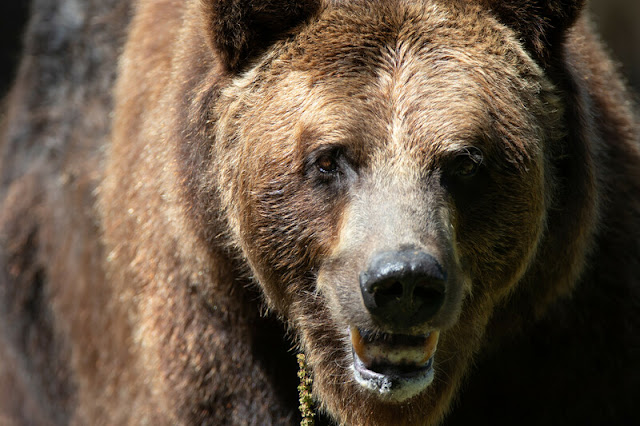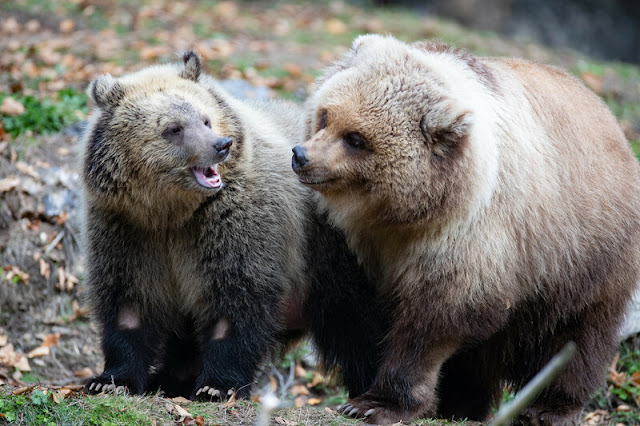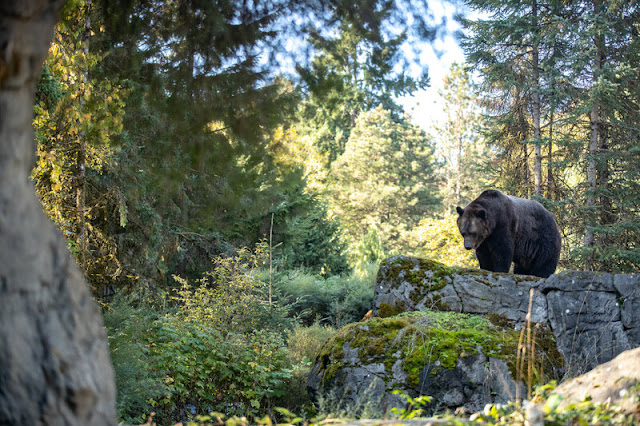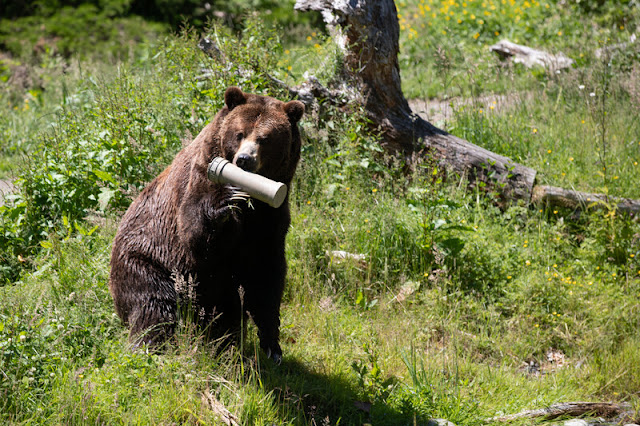Posted by Gigi Allianic, Communications
Photos by Jeremy Dwyer-Lindgren, Woodland Park Zoo
Our hearts are heavy as we mourn the loss of our older male grizzly bear, Keema. The 28-year-old was humanely euthanized on Christmas day due to a severe decline in his health, including a lack of appetite and reduced mobility. Keema would have turned 29 on January 15. Male grizzly bears have a median life expectancy of 21 years in human care, and often less in the wild.
For the past few months, the zoo’s animal care team has had Keema under close observation. He has undergone diagnostic examinations due to declining mobility, but the veterinary team did not find any treatable underlying diseases. The geriatric bear has been on prescribed analgesics and joint medication to address his arthritis and keep him comfortable for as long as possible. “While Keema had been hanging in there, he had been declining in mobility which is not uncommon for aging animals. He was in obvious discomfort today and had deteriorated significantly in health,” said Dr. Tim Storms, director of animal health at Woodland Park Zoo. “We had to make the difficult decision today to humanely euthanize him.”
Keema and his twin brother, Denali, were born January 15, 1994 at Washington State University Bear Center and arrived at Woodland Park Zoo as 10-month-old cubs. Denali passed away in December 2020 just shy of his 27th birthday due to geriatric age-related issues. While grizzly bears are usually solitary animals, the brothers had lived together their entire lives and were only able to get along because they had always been together and there were no female bears present.
“Losing Keema marks the end of an era. For nearly three decades, Keema and his late twin brother, Denali, touched our hearts and minds,” said Kevin Murphy, senior director of animal care at Woodland Park Zoo. “Keema lived a long, enriching life thanks to the dedication and expertise of his animal keepers and our animal health team, as well as the generous support by our donors, members and community. Further, these majestic bears were iconic ambassadors for grizzlies in the state of Washington as they helped to put the spotlight on the importance of coexisting with bears and other wildlife both in urban and remote areas. Keema and Denali will forever live in our hearts.”
As an era ends, a new one begins with the recent addition of two charismatic brown bear cubs, Fern and Juniper, who live in the zoo’s Living Northwest Trail. Fern, a grizzly bear cub, was born this past winter in Montana and arrived as a rescue at Woodland Park Zoo in October. Juniper, a brown bear cub, was found roaming alone near an air force base in Anchorage, Alaska. Like Fern, she was born this past winter and met the public for the first time in August.
“Juniper and Fern have already captivated our members and visitors. It’s absolutely wonderful having these two cubs, who have become best buds, be able to grow up, explore and play together,” said Murphy. Learn more about Juniper’s and Fern’s rescues at www.zoo.org/brownbear.
As a standard procedure, the zoo’s animal health team will perform a postmortem exam to further diagnose factors that may have contributed to Keema’s decline.
Brown bears and grizzly bears belong to the same species, Ursus arctos, although the common name, “brown bear,” typically refers to a coastal bear, while “grizzly bear” usually refers to a (smaller) inland bear. Scientifically speaking, all grizzlies are brown bears, but not all brown bears are grizzlies.
To pay tribute to Keema, adopt a brown bear cub through the zoo’s ZooParent program, which supports the zoo’s animal care, education and wildlife conservation efforts in the Pacific Northwest and around the world. Woodland Park Zoo is a proud member of the Friends of the North Cascades Grizzly Bear Coalition, advocating the restoration of a healthy population of grizzly bears to Washington’s North Cascades Ecosystem.
Photos by Jeremy Dwyer-Lindgren, Woodland Park Zoo
 |
| Keema was the bestest grizzly bear. |
Our hearts are heavy as we mourn the loss of our older male grizzly bear, Keema. The 28-year-old was humanely euthanized on Christmas day due to a severe decline in his health, including a lack of appetite and reduced mobility. Keema would have turned 29 on January 15. Male grizzly bears have a median life expectancy of 21 years in human care, and often less in the wild.
For the past few months, the zoo’s animal care team has had Keema under close observation. He has undergone diagnostic examinations due to declining mobility, but the veterinary team did not find any treatable underlying diseases. The geriatric bear has been on prescribed analgesics and joint medication to address his arthritis and keep him comfortable for as long as possible. “While Keema had been hanging in there, he had been declining in mobility which is not uncommon for aging animals. He was in obvious discomfort today and had deteriorated significantly in health,” said Dr. Tim Storms, director of animal health at Woodland Park Zoo. “We had to make the difficult decision today to humanely euthanize him.”
 |
| Keema and Denali were so much more than beloved members of our zoo family—they were iconic ambassadors for grizzly conservation. |
Keema and his twin brother, Denali, were born January 15, 1994 at Washington State University Bear Center and arrived at Woodland Park Zoo as 10-month-old cubs. Denali passed away in December 2020 just shy of his 27th birthday due to geriatric age-related issues. While grizzly bears are usually solitary animals, the brothers had lived together their entire lives and were only able to get along because they had always been together and there were no female bears present.
“Losing Keema marks the end of an era. For nearly three decades, Keema and his late twin brother, Denali, touched our hearts and minds,” said Kevin Murphy, senior director of animal care at Woodland Park Zoo. “Keema lived a long, enriching life thanks to the dedication and expertise of his animal keepers and our animal health team, as well as the generous support by our donors, members and community. Further, these majestic bears were iconic ambassadors for grizzlies in the state of Washington as they helped to put the spotlight on the importance of coexisting with bears and other wildlife both in urban and remote areas. Keema and Denali will forever live in our hearts.”
 |
| We love you forever, Keema. |
As an era ends, a new one begins with the recent addition of two charismatic brown bear cubs, Fern and Juniper, who live in the zoo’s Living Northwest Trail. Fern, a grizzly bear cub, was born this past winter in Montana and arrived as a rescue at Woodland Park Zoo in October. Juniper, a brown bear cub, was found roaming alone near an air force base in Anchorage, Alaska. Like Fern, she was born this past winter and met the public for the first time in August.
 |
| Fern (left) from Montana and Juniper (right) from Alaska are both rescued cubs. They arrived at Woodland Park Zoo earlier in 2022. |
“Juniper and Fern have already captivated our members and visitors. It’s absolutely wonderful having these two cubs, who have become best buds, be able to grow up, explore and play together,” said Murphy. Learn more about Juniper’s and Fern’s rescues at www.zoo.org/brownbear.
As a standard procedure, the zoo’s animal health team will perform a postmortem exam to further diagnose factors that may have contributed to Keema’s decline.
 |
| Keema will always represent the heart of soul of our Living Northwest conservation mission. |
Brown bears and grizzly bears belong to the same species, Ursus arctos, although the common name, “brown bear,” typically refers to a coastal bear, while “grizzly bear” usually refers to a (smaller) inland bear. Scientifically speaking, all grizzlies are brown bears, but not all brown bears are grizzlies.
To pay tribute to Keema, adopt a brown bear cub through the zoo’s ZooParent program, which supports the zoo’s animal care, education and wildlife conservation efforts in the Pacific Northwest and around the world. Woodland Park Zoo is a proud member of the Friends of the North Cascades Grizzly Bear Coalition, advocating the restoration of a healthy population of grizzly bears to Washington’s North Cascades Ecosystem.



Comments
Post a Comment